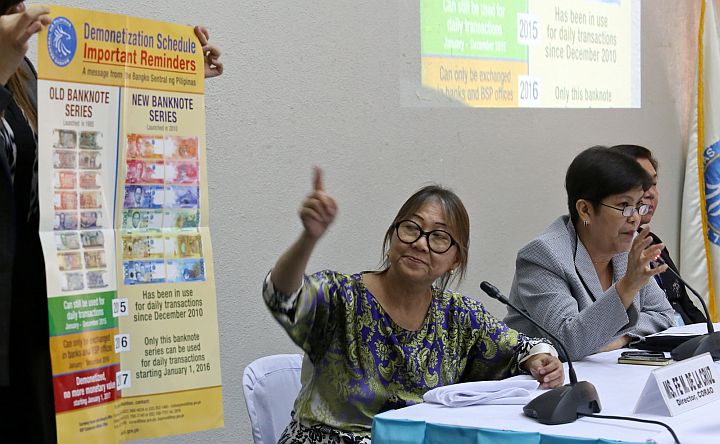Old banknotes no longer legal tender by Jan. 1, 2016
Central Bank officials yesterday reminded bankers and retailers that old banknotes may be used as payment only until December 31 this year.
The old bills will no longer be legal tender by January 1, 2016.
But they may still be exchanged for the new bills at any authorized bank or Bangko Sentral ng Pilipinas (BSP) office or branch until the last banking day in 2016.
Starting January 1, 2017, it will no longer have monetary value, said Iluminada T. Sicat, managing director of BSP Currency Management Sub-sector.
“If you have not exchanged this during the given time period, it becomes a collector’s item. Bangko Sentral ceases to have liability over that,” Sicat said in a briefing yesterday.
The New Design Series (NDS), which was launched 30 years ago in 1985, will be fully replaced by the New Generation Currency (NGC), which was released in 2010.

Banko Sentral ng Pilipinas executives led by Fe M. dela Cruz, corporate affairs director (left), show a poster of the new and old peso bills during the Multi-Sectoral Consultative Meeting and Briefing on Demonetization Program at BSP Cebu regional office.
Sicat said around 20% of NDS, or 542 million pieces, are still in circulation. These old bills have a value of P12 billion.
Sicat said overseas Filipino workers, who are not able to exchange their old banknotes, may email BSP from October 1 to December 31, 2016 to request for an extension and have their currency changed when they return to the Philippines.
They have at most one year, from the moment they sent the email, to do this, Sicat added.
The security features found in the new series have been upgraded to prevent counterfeiters from producing exact replicas, said Therese Domingo, senior currency specialist.
Ordinary people may detect fake bills by checking if the note has the watermark, security threads, security fibers, asymmetrical serial number, see-through mark, optically variable ink (only seen in the P1000 bill), and optically variable device patch (only seen in the P500 and 1000 bills).
The method used to check for genuine notes is called the feel-look-tilt method, said Domingo.
People feel for the embossed print first. Then look for the security threads, fibers and other telling marks on the note. Finally, tilt to see the hidden marks with the help of a light source.
Aside from the security features, the new generation currency banknote series features the new BSP logo, asymmetrical serial number with the digits increasing in size, only six denominations (20, 50,
100, 200, 500, and 1000) as opposed to the old banknotes’ eight denominations, and natural wonders and species at the back.
The new notes are made of 80% cotton and 20% Philippine abaca, which make it doubly as hard for counterfeiters to replicate, she added.
Counterfeiting has been observed to be increasing in the Visayas area, said Sicat. Most counterfeiting cases are still in Manila.
Sicat said the old bills are being demonetized because these have been in circulation for 30 years. She also said BSP wanted to put the latest technological advancement in security features in the currency.
Central banks in other countries currently have a policy to change the design of paper bills at least every five years, and the design of coins at least 10 years in circulation.
The last change of the design of the paper bills was during the demonetization of the Ang Bagong Lipunan series, said Leonides B. Sumbi, acting director of the Currency Issue and Integrity Office.
There have been changes in the design of the coins in the past years, such as those for the 5-peso and 10-peso coins, but this new demonetization project is specifically for paper bills.
The briefing was attended by representatives of the Cebu Bankers Club, the transport and retail sectors and the Philippine Retailers’ Association.
Disclaimer: The comments uploaded on this site do not necessarily represent or reflect the views of management and owner of Cebudailynews. We reserve the right to exclude comments that we deem to be inconsistent with our editorial standards.




